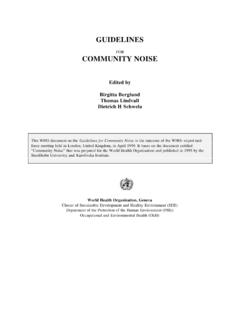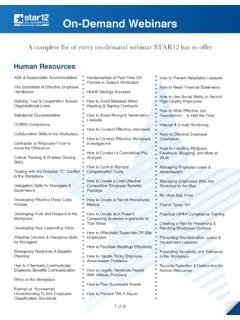Transcription of WHO Forum on Health Data Standardization and …
1 WHO Forum on Health data Standardization and Interoperability3 4 December 2012 Geneva, Switzerland WHO Forum on Health data Standardization and Interoperability3 4 December 2012 | Geneva, Switzerlandmeeting report World Health Organization 2013 All rights reserved. Publications of the World Health Organization are available on the WHO web site ( ) or can be purchased from WHO Press, World Health Organization, 20 Avenue Appia, 1211 Geneva 27, Switzerland (tel.: +41 22 791 3264; fax: +41 22 791 4857; e-mail: for permission to reproduce or translate WHO publications whether for sale or for non-commercial distribution should be addressed to WHO Press through the WHO web site ( ).The designations employed and the presentation of the material in this publication do not imply the expression of any opinion whatsoever on the part of the World Health Organization concerning the legal status of any country, territory, city or area or of its authorities, or concerning the delimitation of its frontiers or boundaries.)
2 Dotted lines on maps represent approximate border lines for which there may not yet be full mention of specific companies or of certain manufacturers products does not imply that they are endorsed or recommended by the World Health Organization in preference to others of a similar nature that are not mentioned. Errors and omissions excepted, the names of proprietary products are distinguished by initial capital reasonable precautions have been taken by the World Health Organization to verify the information contained in this publication. However, the published material is being distributed without warranty of any kind, either expressed or implied. The responsibility for the interpretation and use of the material lies with the reader. In no event shall the World Health Organization be liable for damages arising from its use. Editing and design by In s Communication ReportTable of ContentsAcknowledgement.
3 IiExecutive summary ..1 Background ..3 Rationale for convening the Forum ..3 Preparations for the Forum ..4 Organization of the Forum ..4 Opening remarks ..5 Panel sessions..6 Panel 1. Essentials of Health data standards for Health care delivery..6 Panel 2. Country perspectives on Health data standards implementation..7 Panel 3. Access to Health data standards..8 Panel 4. In-country policy and governance mechanisms for Health data standards adoption ..9 Panel 5. Innovative funding models for Health data standards access and adoption ..10 Panel 6. Human capacity for Health data standards implementation and maintenance ..11 Panel 7. Role of development partners in Health data standards implementation .11 Moving forward..13 Annexes ..14 Annex A Agenda ..14 Annex B List of Panels and corresponding questions..16 Annex C List of participants ..18 WHO Forum on Health data Standardization and InteroperabilityiiAcknowledgementThe World Health Organization (WHO) Forum on Health data Standardization and interoperability was a historical landmark event, held in accordance with the World Health Assembly mandate on Forum was organized by the Knowledge Management and Sharing department of the Health Systems and Innovation cluster at the WHO Headquarters in Geneva, Switzerland.
4 It was co-chaired by Najeeb Al Shorbaji and Ramesh Krishnamurthy. Special thanks are conveyed to Marie-Paule Kieny (Assistant Director-General), Ties Boerma, Xen Santas, Michael Gehron, Monika Kiwewesi, Jian Li and Diane De Claviere for their Forum would not have been possible without the outstanding support, participation and contributions of over 200 individuals from 54 countries. We are especially indebted to the panellists, moderators and rapporteurs: Adebayo Wuraola, Alvin Marcelo, Amani Siyam, Anna Orlova, Antoine Geissbuhler, Beatriz de Faria Leao, Bedirhan Ustun, Bob Jolliffe, Bron Kisler, Charles Jaffe, Christopher Chute, Clayton Hamilton, Daniel Vreeman, David Hunter, David Novillo, Dennis Falzon, Djordje Gikic, Donald Mon, Don Newsham, Edward Rashba, Emma Veitch, Getachew Sahlu, Hani Farouk Mohamed, Hazim Timimi, James Ferguson, Joan Dzenowagis, Jyotsna Chikersal, Kimberly Parker, Lapo Bertini, Lincoln Moura, Mahran Hoseini, Marco Pardave, Marina Torre, Mark Landry, Masahiro Kuroda, Mead Walker, Nellie Keriri Kinyanjui, Nguyen Hoang Phuong, Nosa Orobaton, Paul Bouey, Paul Gerome, Peteris Zilgalvis, Robert Aseltine, Tong Xin, and Walter Suarez.
5 A full list of participants is provided at the end of the current document. We are grateful for their active ReportExecutive summaryAs the United Nations (UN) agency for Health , the World Health Organization (WHO) has recognized the importance of Health data Standardization and its relevance to eHealth systems and services. With a view to supporting Member States in their efforts to implement Health data standards, WHO convened the Forum on Health data Standardization and interoperability in Geneva from 3 to 4 December primary objective of the Forum was to facilitate dialogue among Health data standards development organizations (SDOs), standards maintenance organizations (SMOs), academic institutions, subject matter experts and Member States toward the ongoing efforts to develop a comprehensive roadmap for full implementation of Health data standards for interoperability within countries.
6 The outcomes of the Forum also contribute to the implementation of eHealth Standardization and interoperability being undertaken by included representatives from SDOs and SMOs, UN agencies, academic and research institutions, implementing partners, donor organizations, and subject matter experts, in addition to Member States and WHO technical programmes of both headquarters and WHO Regional 200 individuals from 54 countries contributed to the dialogue on Standardization and interoperability , which addressed 15 key questions (Annex B) related to seven thematic areas. Numerous other participants also followed the event through live Forum focussed on the following seven thematic areas: Contextualizing eHealth and Health data ; essential Health data standards for Health systems performance; common terminologies and minimum data sets. Country perspectives on Health data standards implementation through discussion of critical issues in eHealth systems interoperability ; implementation of Health data standards at all levels.
7 Impediments to access; making Health data standards freely accessible and multilingualism and implementable standards. In-country policy and governance mechanisms for Health data standards adoption through policy and legislation for enterprise architecture and interoperability ; legal framework for multisectoral engagement; Health - data protection, privacy, security and summaryWHO Forum on Health data Standardization and Interoperability2 Innovative funding models for Health data standards access and adoption through free access to Health data standards; innovative funding models for standards development and standards implementation; and increasing levels and efficiency of investments in Health data standards. Human capacity for Health data standards implementation and maintenance through discussion of core competencies required to oversee implementation activities; engagement of universities and academic institutions; and global roster of experts and institutions in standards implementation.
8 Role of development partners in supporting Member States in their efforts to implement Health data standards at national and sub-national meeting report summarizes the proceedings and outcomes of the Forum . Among the key outcomes, Panel 1 concluded that to achieve both semantic and syntactic interoperability , various categories of standards must be implemented as part of strengthening the overall eHealth systems and services at national and sub-national levels. Panel 2 noted that it is essential to have national policies for eHealth and Health information technology (HIT) Standardization . Through discussion in Panel 3, the Forum recognized the need for a global support mechanism to assist Member States, especially low- and middle-income countries (LMICs) to adopt standards at all levels of eHealth systems and services. Panel 4 concluded that a competency-based workforce is essential for successful implementation of standards at national and sub-national levels.
9 It was recognized in Panel 5 that funding needs to be part of a national eHealth strategy in order to sustain the implementation of standards. Panel 6 highlighted the importance of national governments engaging academic institutions and Health -related nongovernmental organizations to formalize specialized training programmes for existing Health care professionals on Standardization and eHealth systems. Because donors demand considerable amounts of data from their recipients on a frequent basis, it was suggested in Panel 7 that funds currently provided to paper-based data collection be redirected to finance standards-based eHealth entire unedited audio recording of the proceedings (containing approximately 13 hours of discussion), including the opening remarks and presentations from panellists and participants, is available at Reportbackground Background The use of eHealth and mHealth should be strategic, integrated and support national Health goals.
10 In order to capitalize on the potential of ICTs [information and communication technologies], it will be critical to agree on standards and to ensure interoperability of systems. Health Information Systems must comply with these standards at all levels, including systems used to capture patient data at the point of care. Common terminologies and minimum data sets should be agreed on so that information can be collected consistently, easily and not misrepresented. In addition, national policies on Health - data sharing should ensure that data protection, privacy, and consent are managed consistently. 1 Rationale for convening the forumInteroperability is widely recognized as essential to achieving the full potential of seamless data exchange using information and communication technologies (ICTs) and medical devices in support of Health systems. Appropriate use of ICTs to deliver quality Health services, reduce costs and achieve universal Health coverage is integral to advancing Health care.


















